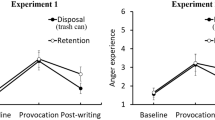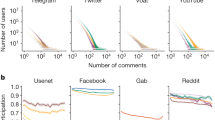Abstract
Hostility towards outgroups contributes to costly intergroup conflict. Here we test an intervention to reduce hostility towards Muslims, a frequently targeted outgroup. Our ‘collective blame hypocrisy’ intervention highlights the hypocrisy involved in the tendency for people to collectively blame outgroup but not ingroup members for blameworthy actions of individual group members. Using both within-subject and between-subject comparisons in a preregistered longitudinal study in Spain, we find that our intervention reduces collective blame of Muslims and downstream anti-Muslim sentiments relative to a matched control condition and that the effects of the intervention persist one month and also one year later. We replicate the benefits of the intervention in a second study. The effects are mediated by reductions in collective blame and moderated by individual differences in preference for consistency. Together, these data illustrate that the collective blame hypocrisy intervention enduringly reduces harmful intergroup attitudes associated with conflict escalation, particularly among those who value consistency in themselves and others.
This is a preview of subscription content, access via your institution
Access options
Access Nature and 54 other Nature Portfolio journals
Get Nature+, our best-value online-access subscription
$29.99 / 30 days
cancel any time
Subscribe to this journal
Receive 12 digital issues and online access to articles
$119.00 per year
only $9.92 per issue
Buy this article
- Purchase on Springer Link
- Instant access to full article PDF
Prices may be subject to local taxes which are calculated during checkout



Similar content being viewed by others
Data availability
The data files that support the findings of the studies are available at https://osf.io/fwp7g/files/
Code availability
Custom code that supports the findings of this study is available from the corresponding author upon request.
References
Lickel, B., Miller, N., Stenstrom, D. M., Denson, T. F. & Schmader, T. Vicarious retribution: the role of collective blame in intergroup aggression. Pers. Soc. Psychol. Rev. 10, 372–390 (2006).
Wilson, S., Miller, G. & Horwitz, S. Boston bombing suspect cites US wars as motivation, officials say. Washington Post https://www.washingtonpost.com/national/boston-bombing-suspect-cites-us-wars-as-motivation-officials-say/2013/04/23/324b9cea-ac29-11e2-b6fd-ba6f5f26d70e_story.html (23 April 2013).
Hanes, E. & Machin, S. Hate crime in the wake of terror attacks: evidence from 7/7 and 9/11. J. Contemp. Crim. Justice 30, 247–267 (2014).
Steele, R. R., Parker, M. T. & Lickel, B. Bias within because of threat from outside: the effects of an external call for terrorism on anti-Muslim attitudes in the United States. Soc. Psychol. Pers. Sci. 6, 193–200 (2015).
Steele, R. R., Rovenpor, D. R., Lickel, B. & Denson, T. F. Emotion regulation and prejudice reduction following acute terrorist events: the impact of reflection before and after the Boston Marathon bombings. Group Process. Intergroup Relat. 22, 43–56 (2017).
Bruneau, E. G., Kteily, N. S. & Falk, E. B. Interventions highlighting hypocrisy reduce collective blame of Muslims for individual acts of violence and assuage anti-Muslim hostility. Pers. Soc. Psychol. Bull. 44, 430–448 (2018).
Aronson, E., Fried, C. & Stone, J. Overcoming denial and increasing the intention to use condoms through the induction of hypocrisy. Am. J. Public Health 81, 1636–1638 (1991).
Dickerson, C. A., Thibodeau, R., Aronson, E. & Miller, D. Using cognitive dissonance to encourage water conservation. J. Appl. Soc. Psychol. 22, 841–854 (1992).
Fried, C. B. & Aronson, E. Hypocrisy, misattribution, and dissonance reduction. Pers. Soc. Psychol. Bull. 21, 925–933 (1995).
Stone, J., Aronson, E., Crain, A. L., Winslow, M. P. & Fried, C. B. Inducing hypocrisy as a means of encouraging young adults to use condoms. Pers. Soc. Psychol. Bull. 20, 116–128 (1994).
Stone, J. & Fernandez, N. C. To practice what we preach: the use of hypocrisy and cognitive dissonance to motivate behavior change. Soc. Pers. Psychol. Compass 2, 1024–1051 (2008).
Son Hing, L. S., Li, W. & Zanna, M. P. Inducing hypocrisy to reduce prejudicial responses among aversive racists. J. Exp. Soc. Psychol. 38, 71–78 (2002).
Cialdini, R. B., Trost, M. R. & Newsom, J. T. Preference for consistency: the development of a valid measure and the discovery of surprising behavioral implications. J. Pers. Soc. Psychol. 69, 318–328 (1995).
Bator, R. J. & Cialdini, R. B. The nature of consistency motivation: consistency, aconsistency, and anticonsistency in a dissonance paradigm. Soc. Influence 1, 208–233 (2006).
Sénémeaud, C., Mange, J., Fointiat, V. & Somat, A. Being hypocritical disturbs some people more than others: how individual differences in preference for consistency moderate the behavioral effects of the induced-hypocrisy paradigm. Soc. Influence 9, 133–148 (2014).
Thoemmes, F. Reversing arrows in mediation models does not distinguish plausible models. Basic Appl. Soc. Psychol. 37, 226–234 (2015).
MacKinnon, D. P., Fairchild, A. J. & Fritz, M. S. Mediation analysis. Annu. Rev. Psychol. 58, 593–614 (2007).
Valente, M. J. & MacKinnon, D. P. Comparing models of change to estimate the mediated effect in the pretest–posttest control group design. Struct. Equ. Modeling 24, 428–450 (2017).
Ho, A. K. et al. The nature of social dominance orientation: theorizing and measuring preferences for intergroup inequality using the new SDO7 scale. J. Pers. Soc. Psychol. 109, 1003–1028 (2015).
Petty, R. E., Haugtvedt, C. P. & Smith, S. M. in Attitude Strength: Antecedents and Consequences (eds Petty, R. E. & Krosnick, J. A.) 93–130 (Lawrence Erlbaum Associates, Inc., 1995).
Paluck, E. L. Reducing intergroup prejudice and conflict using the media: a field experiment in Rwanda. J. Pers. Soc. Psychol. 96, 574–587 (2009).
Kteily, N. S., Hodson, G. & Bruneau, E. G. They see us as less than human: metadehumanization predicts intergroup conflict via reciprocal dehumanization. J. Pers. Soc. Psychol. 110, 343–370 (2016).
Pettigrew, T. F. & Tropp, L. R. A meta-analytic test of intergroup contact theory. J. Pers. Soc. Psychol. 90, 751–783 (2006).
Paluck, E. L., Green, S. A. & Green, D. P. The contact hypothesis re-evaluated. Behav. Public Policy https://doi.org/10.1017/bpp.2018.25 (2018).
Adida, C. L., Lo, A. & Platas, M. R. Perspective taking can promote short-term inclusionary behavior toward Syrian refugees. Proc. Natl Acad. Sci. U.S.A. 115, 9521–9526 (2018).
Simonovits, G., Kézdi, G. & Kardos, P. Seeing the world through the other’s eyes: an online intervention reducing ethnic prejudice. Am. Polit. Sci. Rev. 112, 186–193 (2018).
Bruneau, E. G. & Saxe, R. The power of being heard: the benefits of ‘perspective-giving’ in the context of intergroup conflict. J. Exp. Soc. Psychol. 48, 855–866 (2012).
Hameiri, B., Porat, R., Bar-Tal, D., Bieler, A. & Halperin, E. Paradoxical thinking as a new avenue of intervention to promote peace. Proc. Natl. Acad. Sci. U.S.A. 111, 10996–11001 (2014).
Halperin, E., Russell, A. G., Trzesniewski, K. H., Gross, J. J. & Dweck, C. S. Promoting the Middle East peace process by changing beliefs about group malleability. Science 333, 1767–1769 (2011).
Batson, C. D. & Ahmad, N. Y. Using empathy to improve intergroup attitudes and relations. Soc. Issues Policy Rev. 3, 141–177 (2009).
Swann, W. B., Jr, Gómez, A., Seyle, D. C., Morales, J. F. & Huici, C. Identity fusion: The interplay of personal and social identities in extreme group behavior. J. Pers. Soc. Psychol. 96, 995–1011 (2009).
Fiedler, K., Schott, M. & Meiser, T. What mediation analysis can (not) do. J. Exp. Soc. Psychol. 47, 1231–1236 (2011).
Paluck, E. L. & Green, D. P. Prejudice reduction: what works? A review and assessment of research and practice. Annu. Rev. Psychol. 60, 339–367 (2009).
Hayes, A. F. Introduction to Mediation, Moderation, and Conditional Process Analysis: a Regression-Based Approach 2nd edn (Guilford Press, 2017).
Gómez, Á. et al. On the nature of identity fusion: insights into the construct and a new measure. J. Pers. Soc. Psychol. 100, 918–933 (2011).
Bruneau, E. G., Cikara, M. & Saxe, R. Parochial empathy predicts reduced altruism and the endorsement of passive harm. Soc. Psychol. Pers. Sci. 8, 934–942 (2017).
Acknowledgements
The authors received no specific funding for this work.
Author information
Authors and Affiliations
Contributions
E.G.B. developed the study concept. E.G.B., N.S.K. and A.U. contributed to the study design. A.U. translated all materials into Spanish. Data collection was performed by E.G.B. E.G.B and N.S.K. performed the data analysis. E.G.B. and N.S.K. drafted the manuscript and A.U. provided critical revisions. E.G.B., N.S.K. and A.U. approved the final version of the manuscript for submission.
Corresponding author
Ethics declarations
Competing interests
The authors declare no competing interests.
Additional information
Peer review information Primary Handling Editor: Mary Elizabeth Sutherland.
Publisher’s note Springer Nature remains neutral with regard to jurisdictional claims in published maps and institutional affiliations.
Supplementary information
Supplementary Information
Supplementary Methods 1 and 2, Supplementary Results 1–4, Supplementary Discussion 1–3, Supplementary Tables 1–4 and Supplementary References.
Rights and permissions
About this article
Cite this article
Bruneau, E.G., Kteily, N.S. & Urbiola, A. A collective blame hypocrisy intervention enduringly reduces hostility towards Muslims. Nat Hum Behav 4, 45–54 (2020). https://doi.org/10.1038/s41562-019-0747-7
Received:
Accepted:
Published:
Issue Date:
DOI: https://doi.org/10.1038/s41562-019-0747-7



